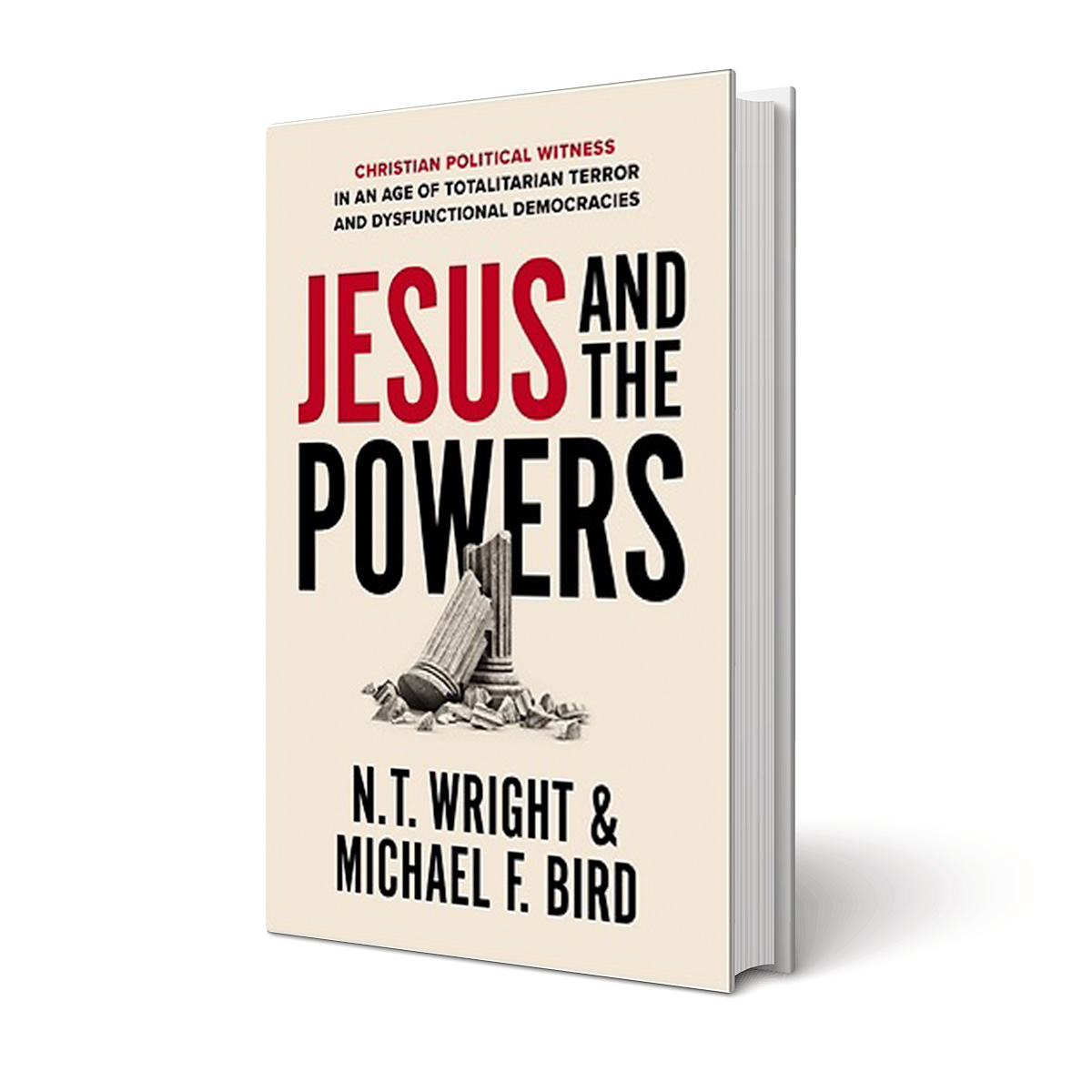In today’s intellectual climate, it is refreshing to find a book on the relationship between Christianity and politics that is neither a reactionary daydream nor a breathless polemic against anyone who thinks there could be Christian influences on political culture. Many of the bestselling books run to extremes—looking for a “Christian prince” who will wield political power to re-Christianize America, or defining “Christian nationalism” so broadly as to indict as a fascist anyone who thinks their “Christian values” should inform their policy preferences.
Doing “kingdom work” means different things to different Christians. But what if there isn’t only one kingdom, but two?

By N.T. Wright & Michael F. Bird
(Zondervan, 2024)
N.T. Wright and Michael F. Bird’s Jesus and the Powers avoids these extremes. Wright, previously the bishop of Durham, is probably the most famous living Anglican theologian. Bird, deputy principal and lecturer in theology at Ridley College in Melbourne, Australia, is also a widely published and influential Anglican biblical scholar. Together, they trace out a Christian political outlook that neither erects a wall of separation nor tethers the faith to the exercise of political power. It is nothing if not a moderate book. No sooner do the authors present a line of argument than they qualify it, as if to say, “Don’t take this too far.”
There is value in such moderation, especially in our age of extremes. If nothing else, the book admirably demonstrates that there are no simple, one-size-fits-all answers to the question of appropriate ways for Christians to engage in politics and social activism. But without those simple answers, we must at least have some reliable method to help us make our way through the confused landscape and keep us from conflating Christian truth with political preferences. Although the authors are aware of the danger of such confusion, the framework they employ—“building for the kingdom”—is not particularly helpful and may actually encourage some of the more extreme approaches they eschew.
Wright and Bird use a common evangelical trope to structure their message: “building for the kingdom”:
The Church’s message and mission rest on the notion that God is King, God has appointed Jesus as the King of kings and Lord of lords, and the Church’s vocation is to build for the kingdom.
The kingdom, they stress, is here and now. In keeping with some of Wright’s previous writings, much of their argumentation is aimed against the tendency to focus exclusively on “getting to heaven,” seeing the Christian life in this world as but a temporary holding pattern. Accordingly, “building for the kingdom” means working to transform the present world in ways that prepare it for its final fulfillment at the end of time.
In Richard Niebuhr’s categories, the authors fall firmly into “Christ the transformer of culture,” emphasizing the many ways the rise of Christianity reshaped ethical values as well as cultural and political expectations. They clearly stipulate that they are not teaching that Christians here and now will simply create, by their own work, the kingdom of God. God alone will bring the fullness of the kingdom, they argue, but we are enlisted to participate in his work, preparing the wider world for the end of time by bringing its powers, institutions, and practices more in line with the teachings of Christ. In eight somewhat meandering chapters, the authors use this paradigm to range across biblical exegesis, church history, vocational guidance, and contemporary political commentary.
The authors tend to treat the Church’s charge as a continuation of the charge to mankind to ‘take dominion’ of creation.
Importantly, “the kingdom” they speak of is most definitely singular. The authors reject any dualist, “two-kingdoms” approach that would distinguish between God’s rule over the fallen world on the one hand and his rule over the Church on the other. Rather, the authors tend to treat the Church’s charge as a continuation of the general charge to mankind to “take dominion” of creation, or, as they say, to get “the creation project back on track” after the Fall. This entails reforming the “powers” of the earth—which were established by God for good but continually set themselves against him—to conform to God’s expectations.
The Church’s work, therefore, is mostly discussed in terms of its external activities and engagement with the rest of the world—about what it must do in response to something or someone else. They speak, for instance, of “where the Church sits between presidents and principalities,” of the “missional vocation and kingdom witness of the Church,” and of “the Church calling the powers to account.” There is not much, however, about the internal activity of the Church.
Although they call for robust political engagement in the world, they are also—in keeping with their moderation—clear about the dangers such activity poses, imploring Christians not to seek political power for its own sake, to use political power to establish “Christian hegemony,” or to succumb to the temptation of utopianism. While the Christian’s work is meant to usher in God’s kingdom, he must be moderate and prudential, recognizing that he will not establish that kingdom in its fullness.
The authors do not seek to lay out a comprehensive, detailed vision of what Christian political engagement should aim for. Yet, given the delicate balance they seek to establish, their description of Christian politics is unhelpfully vague.
They believe the Church’s core purpose demands that it “get involved” in political debates. Rather than compartmentalize their faith, Christians must—in a phrase that exemplifies their vagueness—“do God” in public. On the flip side, they lament the use of Christianity to promote “unchristian policies” on “immigration, income inequality, healthcare, and a myriad of other issues.” But how exactly the Christian is meant to approach these issues is left ambiguous. With rigid civil enforcement of the Ten Commandments? (It certainly doesn’t seem to be this.) Governance modeled on the Sermon on the Mount? A generic sense of loving one’s neighbor? Or just through visible Christian “witness” and persuasion? They do not wrestle with the details and difficulties of these different possibilities. Rather, most of their analysis of political issues is presented in contemporary centrist, terminology: fighting “oppression,” standing up for “people on the margins,” rejecting “identity politics,” supporting “liberal democracy” and “confident pluralism,” and “being vigilant against free market fundamentalism.” They offer practical arguments for some of these commitments but no method for determining “Christian” and “unchristian” positions.

The authors are similarly vague about the criteria for resisting government. They stake out a characteristic middle ground on interpreting Romans 13—holding that there is some obligation to obey civil authorities (they find the American Revolution to be unjustified—perhaps unsurprisingly for an Englishman and an Australian), but that such obligation runs out under certain circumstances. But here again, they tend to rely on modern categories and terminology, saying that we must only resist government to “uphold civil rights” or fight against “violent authoritarians.” When they do offer general rules, they raise more questions: “The government’s authority is … conditional upon its performance to meet God’s standards of righteousness and to win the consensus of the people in how they wish to be governed” and “Only good government can claim the mantle of a divinely appointed authority.”
Given the authors’ discussion elsewhere, the reader can presume that “God’s standards of righteousness” here does not entail “be ye perfect” but some other, lower standard. Without making some dualist distinction between God’s “standards” for civil government and his “standards” for Christians and the Church, however, it is difficult to know what exactly their criterion of good government is, aside from presentist preferences.
Their “building for the kingdom” paradigm thus reopens and leaves unresolved age-old difficulties with the idea of the gospel—and the ethical response that it calls forth—serving as the basis of civil authority. “Do not resist evil” will not function as a rule of civil government. Two-kingdom doctrines were meant to provide an answer to such difficulties, by simultaneously affirming the importance of civil and social questions while separating them from the highest spiritual fulfillment. The thief on the cross asked for the unreserved forgiveness of his sins from Christ, even as he recognized that the civil authorities punished him “justly.” The authors break down that division, arguing that our social and political activism should indeed aim to “Christianize” political and social life—and yet they still hope to maintain a moderate, non-utopian approach to politics.
The flip side of a “Christianized” politics is usually a politicized Church. This is also something the authors clearly do not want. They caution that political engagement should not be undertaken in a way that loses sight of the spiritual. Yet their model tends (unintentionally) to lose the radicalness of the gospel and the separateness.
A Church focused on directing world affairs and winning the political and social battles of the day is, at the very least, at risk of losing what sets it apart from all the rest of the world. When Christ says in the Sermon on the Mount to “seek [not ‘build’] ye first the kingdom of God,” he does not give instructions for transforming empires through public activism. Quite the opposite—he says to be like the lily of the field and the bird of the air, ridding oneself of the conceit that our own activism and planning will determine our fate.
If the Church of all believers is the very kingdom, its central ‘building project’ is itself.
Insofar as the Church’s primary work comes to be seen as tied up with the “issues of the day,” it becomes banal and commonplace—yet another player of the game that has “something to say.” It is difficult not to lose sight of the spirituality of the Church or the radical message of the gospel if one sees the expansion of God’s kingdom coinciding with correct policies and social attitudes—however important those may be. While the Church may have an external mission, it also has an internal one, which St. Paul says is “folly” to the wider world.
All this circles back around to the authors’ most important theological premise: that the building of the kingdom of God is the active transformation of the institutions of this world, brought about in part through human activity aimed at getting the world “back on track.” Insofar as one accepts that premise, Wright and Bird’s analysis can at least hold some water.
But if one starts with a different premise, namely, that the Church is not the builder of the kingdom of God but simply is the kingdom of God, their framework for political engagement goes out the window entirely. If the Church of all believers is the very kingdom, its central “building project” is itself—conducting its internal affairs well by dispensing God’s gifts to its members and bringing more people into its realm. That doesn’t mean that the Christian is forbidden from engaging in politics or social life, but it would require an entirely different starting point than that offered by Wright and Bird. Nor does it mean the wider world isn’t God’s realm, too—only that there is a fundamental difference in how he relates to it.
The authors are wrong to suggest that this insistence on the separateness and spirituality of the Church amounts to hiding in the catacombs or just waiting passively until a rapture, when we can “get to heaven.” A dualist understanding of God’s kingdoms can still recognize that both realms are here and now—that we live with different forms of authority, and hold different expectations, for both the old and the new creations.
One ingredient of the “Christian nationalist” stew is an extremely high expectation about what can be accomplished through planned political and social action. Politics, in this view, doesn’t require accommodation to and mitigation of present realities so much as the gumption and strength of will to transform the corrupt world. Wright and Bird are very critical of these “authoritarian” tendencies. But despite their hedging, moderation, and centrist political preferences, they are pointing to a conception of politics not altogether different. It is much easier said than done to engage in political life with the expectation of ushering in God’s kingdom without succumbing to a sense that one’s own will and exertions are what drive history. And that should remind us that, though Christian nationalism today is considered a far-right phenomenon, history has shown that enlightened, progressive liberal democracy is quite capable of bearing its standard, too.




